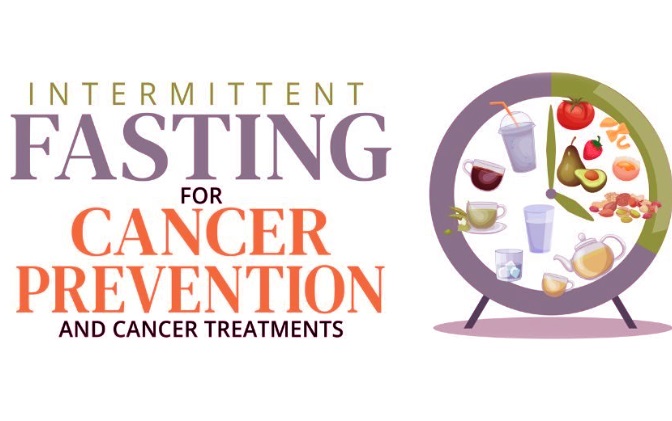Study Finds That Intermittent Fasting Helps Starve and Kill Cancer Cells Through Cellular Cleansing
Nikhil Prasad Fact checked by:Thailand Medical News Team Jun 29, 2025 7 months, 2 weeks, 22 hours, 59 minutes ago
Thailand Medical News: A new study by scientists from the Pomeranian Medical University in Szczecin and the University of Szczecin in Poland, in collaboration with the Norwegian University of Science and Technology, is shedding light on how intermittent fasting may play a powerful role in fighting cancer. Their research delves into how fasting triggers a vital cellular cleansing process called autophagy that may stop cancer cells from growing and even help destroy them.
 Study Finds That Intermittent Fasting Helps Starve and Kill Cancer Cells Through Cellular Cleansing
Study Finds That Intermittent Fasting Helps Starve and Kill Cancer Cells Through Cellular Cleansing
Autophagy, a self-cleaning system that cells use to recycle damaged components, is at the center of the study. The researchers explain how this natural process can both protect the body from cancer and, paradoxically, sometimes help cancer survive under stress. However, in this
Thailand Medical News report, the spotlight is on how intermittent fasting (IF) helps turn autophagy into a cancer-fighting ally.
What Exactly Is Autophagy and Why Is It Important
Autophagy literally means “self-eating,” and it's how cells clean out damaged parts, get rid of waste, and keep themselves healthy—especially during stress, like when food is scarce. During intermittent fasting, the body senses lower energy availability, which triggers autophagy. This helps eliminate malfunctioning cell parts and proteins that could otherwise become cancerous.
There are three types of autophagy: microautophagy, chaperone-mediated autophagy, and macroautophagy. Each has its own role in cleaning different types of cell waste. The study highlights macroautophagy as especially important during fasting, as it actively clears out damaged mitochondria and proteins, making it harder for cancer to take root or grow.
Fasting and Cancer Cells What the Studies Show
Fasting reduces levels of insulin and a growth factor known as IGF-1—both of which cancer cells depend on. It also slows down the cancer cell’s metabolism and makes them more vulnerable to treatments like chemotherapy. The researchers observed that during fasting, cancer cells become less able to resist oxidative stress (a condition that damages cells), making them more likely to die.
More importantly, IF disrupts a survival strategy many cancer cells use called the Warburg effect—where they consume large amounts of glucose to thrive. Fasting starves cancer cells of glucose, boosting oxidative damage and ultimately pushing them toward death through autophagy.
The study noted that intermittent fasting can also help reduce harmful immune cells that aid cancer growth, while boosting beneficial immune responses that help kill cancer cells.
Evidence From Lab and Animal Experiments
Animal models in the study showed that when chemotherapy was combined with intermittent fasting, tumor growth was significantly reduced. For example, in mice with fibrosarcoma, 48 hours of fasting before ch
emotherapy drastically slowed tumor progression—but only when the immune system and autophagy were functioning properly.
Other tests demonstrated that fasting alongside chemotherapy drugs like cisplatin or doxorubicin made cancer treatments more effective. Fasting not only disrupted cancer cell metabolism but also triggered autophagy to clean out damaged proteins, further weakening cancer’s defenses.
Promising Results from Early Human Trials
Human trials, though limited in number, showed encouraging signs. Women with breast cancer who followed a fasting-mimicking diet had lower insulin and glucose levels before surgery. Other trials involving patients with gliomas and gynecological cancers reported fewer chemotherapy side effects and improved well-being when intermittent fasting was included.
One larger trial with 101 patients found significant drops in blood glucose and insulin, along with a stronger anti-cancer immune response.
Not a One Size Fits All Approach
While the benefits are promising, the study also cautions that intermittent fasting is not suitable for everyone—especially cancer patients suffering from cachexia, a condition involving severe weight loss and muscle wasting. In these cases, fasting could worsen the patient’s condition. More research is needed to identify which cancer types and patient profiles benefit the most.
Conclusion
Intermittent fasting may serve as a powerful complementary tool in cancer therapy, activating cellular cleansing pathways that weaken cancer’s ability to grow and spread. It disrupts the cancer cells’ metabolism, enhances the effectiveness of chemotherapy, reduces tumor-friendly immune responses, and helps eliminate toxic components within cells. However, doctors need to carefully evaluate patient health before recommending such strategies, and further clinical trials are essential to establish safety and effectiveness in broader patient groups.
The study findings were published in the peer reviewed International Journal of Molecular Sciences
https://www.mdpi.com/1422-0067/26/10/4742
For the latest on Cancer, keep on logging to
Thailand Medical News.
Read Also:
https://www.thailandmedical.news/news/breaking-covid-19-infection-triggers-genetic-change-in-thyroid-tissues-that-accelerates-thyroid-cancer-progression
https://www.thailandmedical.news/news/study-alarmingly-finds-that-ct-scans-are-possibly-triggering-the-onset-of-cancers
https://www.thailandmedical.news/news/shiitake-mushrooms-show-incredible-promise-in-fighting-gut-inflammation-and-colon-cancer
https://www.thailandmedical.news/articles/cancer
